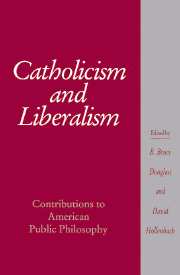Introduction
Published online by Cambridge University Press: 19 February 2010
Summary
Neither as a doctrine nor as a project is the American Proposition a finished thing. Its demonstration is never done once for all; and the Proposition itself requires development on penalty of decadence. Its historical success is never to be taken for granted, nor can it come to some absolute term; and any given measure of success demands enlargement on penalty of decline.
John Courtney Murray, SJAmerica, scholars are fond of saying, is a nation that owes its existence to ideas. Perhaps uniquely so. And what they have in mind, of course, when they speak this way are serious ideas – ideas of the sort that find expression in solemn declarations and lend themselves to being characterized as a “philosophy.” It is a paradoxical claim, to be sure, because the way of life that has developed on these shores is scarcely one that has been conducive to philosophical reflection. And it cannot be said that philosophical reflection is an activity held in much respect by Americans, either. But the claim remains true, nonetheless, and it tells us something important about who we are as a people.
For even though we may pride ourselves on being “pragmatic” (as opposed to doctrinaire) and go out of our way to insist that one person's opinion is as good as the next (almost regardless of who the person is and what the opinions in question are), there is, at the same time, no mistaking the fact that there are some things about which we are very principled. We may be disinclined to read philosophical works very much and impatient with the sort of arguments they expound.
- Type
- Chapter
- Information
- Catholicism and LiberalismContributions to American Public Policy, pp. 1 - 16Publisher: Cambridge University PressPrint publication year: 1994

